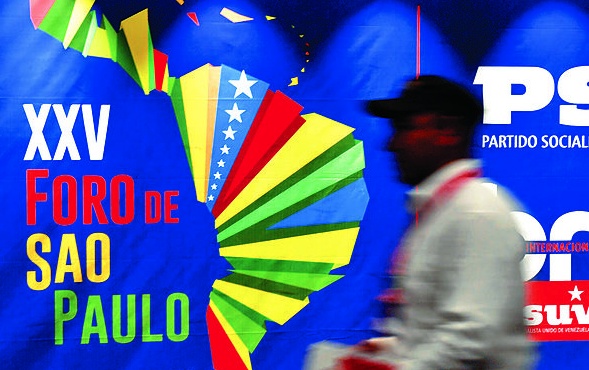In its first meeting since the pandemic, the ideologically leftist Puebla Group (PG) expressed high hopes. While waiting for the “progressive winds” of the forthcoming electoral processes, the democratic and authoritarian lefts are closing ranks against “neoliberalism”. The final declaration of the PG also supports Latin American dictatorships, led mainly by Cuba. Meanwhile, the Spanish right-wing party VOX is trying to position itself in Latin America as the spearhead of the anti-communist movement. This bipolar dynamic puts forces of the center-right spectrum in particular under strain.
Radiant and without facemasks, former Spanish Prime Minister José Luis Rodríguez Zapatero, leftist and authoritarian former President of Ecuador, Rafael Correa, and current Mexican Foreign Minister, Marcelo Ebrard, posed together for the photographer. They had just inaugurated the latest meeting of the Puebla Group, which brought together, from November 30th to December 1st, some 200 “progressive leaders” to the Mexican capital. However, the signal that the meeting under the slogan “Change Now” should send was clear: the united left is back, gaining influence and uniting against the common opponent. In its final declaration, the GP called for nothing less than the replacement of the “anachronistic neoliberal model” with a “solidarity-based development model”.
While the document contributes rather little in concrete terms as to what this new model should look like, it speaks generally in favor of a strong role for states in public investment, a special session of the UN General Assembly regarding global paths out of the pandemic, decarbonization of the economy, “multilateralism”, a global minimum tax of at least 21 per cent and the “values of feminism”.
As for the commitment to freedom and democracy, the document is ambivalent. While it calls for “democratization that gives space to new voices,” the word “democracy” as a basic concept appears only once more in the 2,629-word text.
For the public’s perception, the Puebla Group overlaps with the “Foro de São Paulo”, a formal association of leftist parties founded in 1990 by then-Brazilian presidential candidate Lula da Silva. According to its website, the São Paulo Forum today brings together 123 parties from 27 countries, which go from the Communist Party of Cuba and the Socialist Unity Party of Venezuela (PSUV) to democratically established center-left forces, such as the Socialist Party of Chile, the Workers’ Party of Brazil or the Frente Amplio of Uruguay. The most important organizational difference between the São Paulo Forum and the Puebla Group is that the former is a formal association of parties, while the latter is formed by a group of individuals. In both organizations, however, there is a similar mix of autocratic, populist and democratic elements. What is clear in both cases though, is that ideology trumps democratic convictions.
Praise for Mexico, Cuba and Venezuela
As a gift to the Mexican host, so to speak, the Puebla Group celebrated the “deepening of democracy” made by the left-wing populist government of President Andrés Manuel López Obrador. This praise came only days after Lopez Obrador had issued a decree allowing him to award major infrastructure projects, practically by hand and without any transparency, rather than through the legal bidding process. Still, former Brazilian President Dilma Rousseff celebrated the Mexican government as a “light for Latin American integration.”
The Puebla Group’s Mexico declaration also adopts the propaganda of the Cuban dictatorship when it stands in solidarity with “the Cuban people” and names the US sanctions as the cause of “social unrest” and the most recent protests fueled by “networks and enemies of the Cuban revolution financed and promoted from the United States”. The Group also declares its “support for the Venezuelan democracy” and rejects any “foreign interference.”
It is clear that the international left in Latin America has high hopes. After changing the political course in Mexico (2018) and Argentina (2019), the political axis shifted further to the left thanks to the election results in Bolivia (October 2020), Chile (election of the constituent assembly and the Presidency in 2021), Peru (June 2021) and Honduras (November 2021). Great hopes were pinned in Mexico City, said former Colombian President Ernesto Samper, on a continuing “progressive wind” in the region and thus, on an electoral victory by left-wing populist Gustavo Petro in Colombia in May 2022 and, especially, by former President Lula da Silva in Brazil in October 2022. Both seems possible according to current polls.
The response from the populist right
Since the beginning of the pandemic, the populist Spanish right-wing party Vox has been deliberately trying to position itself as the antagonist of the two left-wing alliances. Its leader, the Spanish deputy Santiago Abascal, is promoting the Madrid Forum, an “international alliance to counteract communism”. The goal is nothing less than “to be the answer to the São Paulo Forum and the Puebla Group.”
Its main instrument is the “Carta de Madrid”, a document with close to 10.000 signatories mainly from Politics, Academia and Civil Society. The “Carta de Madrid” sees a “communist advance” threatening law and freedom and commits itself to the rule of law, the separation of powers, the freedom of expression and private property, the “defense” of political and social freedoms. It further contains the promise of the signatories to work for democracy, human rights, pluralism and justice. Largely careless of the pandemic, VOX delegations traveled to the Americas to promote their activities in 2021, including Colombia, Mexico, Peru, Ecuador and the US.
In doing so, they succeeded in getting numerous representatives from politics and civil society to sign the “Carta de Madrid”. Among the signatories are politicians from right-wing populist parties in close harmony with those from center-right parties. This activism is complemented by the Disenso Foundation, a charity close to VOX which is also directed by Abascal, and which invites young Latin American politicians to study programs in Spain. Thus, VOX brings together democratically dubious actors with firmly established party representatives of the center in a common cause.
At least, it doesn’t seem completely out of place to draw a comparison with the other political side here. Presenting itself spearhead against Latin American “totalitarianism” and “communism”, Vox aims at gaining an international legitimacy that it could hardly have achieved otherwise. Unsurprisingly, Abascal would like to have more in the future: a permanent structure and an annual action plan.
And the political center?
Locked into government responsibilities in the Covid-19 context or preoccupied with domestic issues, many moderate parties have been thoroughly surprised by such activism. Addressing individuals rather than entire party structures allows both the “Grupo de Puebla” and the “Foro Madrid” to override the latter.
It is not easy, especially for representatives of the often heavy-handed center-right parties, to respond appropriately to these tactics. The temptation to jump into the same boat with VOX against the increasingly strong organized left is great. Yet there is often a lack of awareness that truly credible action against the region’s organized left-wing authoritarianism is only possible with partners whose liberal and democratic identity is beyond doubt.
*Original publication in German on the website of the Konrad Adenauer Foundation, December 13, 2021.
Translation from Spanish to English by Ricardo Aceves













